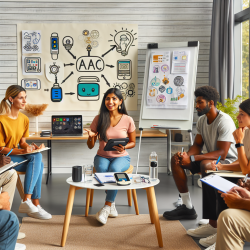In the realm of augmentative and alternative communication (AAC), the journey of developing early communication skills is intricate and multifaceted. The role of facilitators—those who support individuals in overcoming communicative challenges—is paramount. Recent research, particularly the study conducted by Elizabeth Walker and Kim Antonius at the Hugh MacMillan Rehabilitation Centre, sheds light on the efficacy of group intervention for AAC facilitators. This article aims to provide practitioners with actionable insights and encourage further exploration into the realm of AAC facilitation.
The transition to group intervention models represents a significant paradigm shift in AAC service delivery. Traditionally, AAC facilitation has leaned heavily towards individualized consultation and intervention. However, the group intervention model, as explored in the study, focuses on empowering facilitators of individuals developing early communication skills through structured group sessions. These sessions aim to equip facilitators with the knowledge, skills, and resources necessary to effectively support their clients' communicative development.
Key Findings from the Research
- Group intervention can foster a supportive community among facilitators, providing a platform for sharing experiences, strategies, and challenges.
- Structured group sessions can enhance facilitators' skills in developing, implementing, and modifying AAC programs tailored to their clients' needs.
- Facilitators report increased confidence and independence in addressing their clients' communication goals as a result of participating in group interventions.
- Challenges such as facilitator turnover, the need for individualized consultation, and ensuring comprehensive representation of each client's team were identified.
Implementing Group Intervention Outcomes
To leverage the benefits of group intervention for AAC facilitators, the following strategies are recommended:
- Establish a Supportive Network: Create regular opportunities for facilitators to meet, share experiences, and discuss client progress. This network can be facilitated through in-person meetings or virtual platforms.
- Focus on Skill Development: Structure group sessions around specific themes or challenges in AAC facilitation. Include hands-on activities, role-playing, and case studies to enhance learning.
- Provide Comprehensive Resources: Equip facilitators with a toolkit of resources, including articles, handouts, and access to AAC devices and software, to support their ongoing learning and application.
- Address Individual Needs: While group sessions are beneficial, recognize the importance of individualized support. Offer targeted consultation sessions to address specific facilitator or client challenges.
- Promote Client Involvement: Whenever possible, involve clients in group sessions through case presentations or video examples. This approach can help facilitators better understand their clients' perspectives and needs.
Encouraging Further Research
The findings from Walker and Antonius's study open the door for further exploration into group intervention models for AAC facilitators. Future research could investigate long-term outcomes for both facilitators and their clients, the impact of group intervention on client communication skills development, and strategies for overcoming identified challenges.
For practitioners and researchers alike, delving deeper into the efficacy of group intervention models holds the promise of enhancing the quality of AAC facilitation and, ultimately, improving the communicative outcomes for individuals with complex communication needs.
To read the original research paper, please follow this link: The Efficacy of Group Intervention for AAC Clients who are Developing Early Communication Skills.










